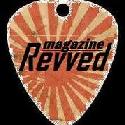(click on picture to open file)
By: Michael D. Vogel
© Aprl 14, 1997. Michael D. Vogel. All Rights Reserved.
Published in:
Aggro-Active magazine – May 2, 1997
Free Gotham – September 30, 2011
Over the years, critics have easily dismissed aggressive rock and heavy-metal music as trivial and unimportant. For the most part, the genre has often endured through charges of stupidity and shallowness. But when a particular artist has made such a substantial contribution to impact the whole hard rock music scene, non-believers are usually nowhere to be found.
Take Bruce Dickinson for example. A quick glance over his albums and a meticulous listen to the music will have many judges of musical taste shaking at the grotesque corpse-ridden cover art as well as his trade-mark air-raid siren style on vocal arrangements. But further investigation bears far more interesting results. He has helped to spearhead a new wave of British heavy metal by discarding the pomposity of British heavyweights, like Deep Purple in favor of his own DiY. approach. Owing more to a speed drenched punk-rock assault then the ostentatious approach of Black Sabbath; Bruce Dickinson’s latest effort is marked by relentless urgency in both performance and arrangement.
Relying on more of a complex, operatic song structure, Bruce Dickinson has brought back intelligence to the new metal revolution. With songs that are rampant with science fiction imagery, Bruce is also quick to incorporate classic history lessons into his heavy metal songbook.
With a solid foot in the past and a healthy look to the future, Bruce Dickinson imparts his wisdom on me about life, music (past, present and future) as well as the state of the new metal revolution.
What do you feel is the most entertaining article you’ve read about yourself?
Bruce Dickinson: “I am most fond of an article that appeared in Sports Illustrated. It was a very cool piece about fencing that I thought showed an accurate reflection of what the sport is all about. It was very refreshing actually; sometimes, when you work in a particular field like music and entertainment, you tend to carry a lot of baggage with you to interviews. People have pre-formed opinions and ultimately tend to write from that perspective. Instead of actually seeing what’s there and listening to what the person has to say, some journalists enter the interview with an attitude and end up playing head games instead. Life is about having fun and climbing mountains.”
What do you hope to achieve from the audience during your live shows?
BD: “There is a certain kind of release that comes with doing a live rock show. Under the right conditions, it can really propel you into a heightened state of spirituality. It’s as if there’s a presence that helps to fit everything together. I want the audience to feel what I feel, so when it all clicks together, I try to incorporate them into that feeling. The end result, hopefully, when I come off stage, and there is a certain electrical buzz in the air, there has been a direct connection with the audience.
“The size of the venue and the medium that the concert will be presented all help in determining how you approach the show. It’s like coaxing the thing to life with the help and participation of a live and active audience. It has always been my goal to somehow make the show uplifting. I strive for everyone to get something out of the show that is special and unique to them. It’s as if I’m the conduit between the music and the audience – a free flow of energy between the audience and the band that just so happens to go through me. In my opinion, that is what a rock concert is all about.”
Do you find that these expectations are met during your live shows?
“When I was in Iron Maiden, there was a certain level of expectations and ultimately a level of achievement that was achieved. We always had a minimum standard as to the type of show we would put on. As a band, we would settle for nothing less from ourselves, nor would the fans. It was as if there was almost an unspoken ritual between us. So even a ‘mediocre’ Maiden show was still, technically, a pretty darn good show.
“These kinds of standards really can be a double edge sword though, being both a blessing and a curse. In many ways it can be very exciting and frustrating all at the same time. As a band, our rules and standards had evolved along with our fans and us. But, when I left Iron Maiden, it became increasingly more difficult to follow those same guidelines the band had developed. In most cases, I was dealing with new songs and musicians that for the most part people are unfamiliar with. As a result, I realized how much being in Iron Maiden allowed me to take the audience a little bit for granted.
“But, at the same time, there was a realization about coming back to do a metal album. The last few albums have been, to a greater or lesser extent, some of the most introverted material I have ever recorded. Somewhere along the line, I decided that there needs to be more. Things needed to ‘get off’ a little more – this wasn’t meant to be music for a smoky jazz club. It was as if I had been transformed into a child rummaging in the attic through old and forgotten toys.”
Have these experiences led you to feel a certain level of isolation?
“That really depends on a lot of factors. I still find it extremely difficult to think of myself as a solo artist because I perform with a band. As I see it, the guitarist, the bass player and the drummer are equally as important as me. I’m only the singer in the band. Each member adds to the overall element that the band is trying to present where I am only the ringmaster. Without them, I would fall flat on my face.
“The new album is really a return to story telling as opposed to just recounting my past experience and how I felt about them. When you’re telling a story through music, the frame can be very important in how you view the picture. Because you are attempting to paint a mental picture though song, it is very essential to present the right vibe so that the participant can be in the correct frame of mind. The results can be simply amazing – like the longest, biggest and slowest orgasm you have ever had in your life. My purpose is really only to be the leader of the sound and story.”
Do you feel that today’s musicians have anything important to say?
“In truth, every generation of music goes through three different stages, adolescents, middle age and finally the BS phase. In my opinion, alternative music in now in that final phase. What made the Seattle thing so unique was that people like Kurt Cobain had important things to say. At the beginning of the 80′s metal was the cool and happening expression of music in the world. The end of the decade saw rise to the big hair bands and everything pretty much turned into a mess. As a result, the audience just swept it all away. At the beginning of the 90′s, nobody saw the genius of Kurt Cobain coming and for the most part people are blind to the resurgence of the whole metal genre. I think that we are already in the middle of the new metal revolution and somewhere out there, in garage-land, is the new Led Zeppelin or Nirvana.
“Everything in life is very cyclical in nature, but it never comes back in entirely the same form either! That is what truly makes me excited. I get the feeling there is a buzz that young musicians are taking the music back for themselves.”
With the recent explosion of new “neo-metal” bands emerging on the music scene, why do you think there is such a serge in excitement for a formally dead genre?
“How I see it, ‘metal’ is actually at the roots of what was the last musical revolution. Soundgarden is a hard rock band and Nirvana is a direct collision between Black Sabbath and The Beatles, both of which have been embraced by the alternative radio. I think people are ready again for the real thing. Today’s kids are more interested in guitars again. The immense popularity of the KISS reunion proved that!”
Why do you feel men 15 to 40 embrace your music more, both philosophically and musically, as opposed to women in the same age bracket?
“There is somewhat of a disproportionate weighting towards men, in terms of the overall amount of people that listen to hard rock music. Women like a variety of music where as men seem to be a little more singularly focused. They get into a groove with a certain type of music and totally amerce themselves in it. I don’t think most women necessarily bond in the same way.
“Personally, and without trying to sound like a line from Spinal Tap, I try to incorporate the female perspective into what ever I’m writing and recording. Led Zeppelin were masters of that. There is a certain feel of sensuality to their music, which is why they appealed to both men and women across the board. Although you can’t say Iron Maiden’s music was very sensual, musically I am moving more of that direction.”
Where does the spiritual and mystical realm enter your musical picture?
“Before writing a song, I get the feeling of where the song is going. I also incorporate the sounds; textures as well as the overall feel of the song. It is only after this point that I then begin to shape the words and maybe even pint the song in a certain direction. But this is only after the basic structure of the song is already in place. Therefore, spirituality and the mystical realms are really only the end product of it all.”
Does this type of imagery help allow for leverage to be ourselves within someone else’s guidelines?
“For the most part, whether you intend to or not, people will do that anyway. But as soon as I came to realize that we are all guilty of that, including myself, I began to throw little curve balls in my music. A song must work on a basic level, both musically and lyrically. Once that is achieved, you can start including a variety of things. For example, in `Taking The Queen‘, I had to write a fairy tale before I could get to the end story that would become the song. In ‘Man Of Solo‘ was written back when I was an undergraduate at the age of 18. The song just sat there for over 12 years before I revisited it. One afternoon, everything suddenly fell into place, resulting in the current rendition of the song.”
Do you feel that fear is a necessary element in music?
“The darker human emotions are always going to be the most interesting, whether we like it or not. In Shakespearean play, why would someone want to be Othello when they could be Yargo? Who would want to be the good guy when you can be the most evil ruler breaker around? Unfortunately, the more twisted and warped the character, the more interesting they are.
“In a way, music is very similar. When you start to write a new song and the story starts and ends happily, nothing has really happened in between. But certainly, when you incorporate science fiction and fantasy into the lyrics, you are making the story that much more interesting. On a grand scale, you are ultimately dealing with images of life and death.
Do you see the music as soundtrack for a future apocalypse or is it a way to open people’s eyes to a brighter future?
“I see a great deal of doom and gloom in the world today. It is documented every night on your local news stations. But that doesn’t mean we have to accept and embrace it. If there wasn’t a dark side there would be no measurement for what is good. One cannot exist without the other. Therefore, it would be almost impossible to insulate one’s self from anything that could possibly be harmful. Life is always going to be one great big challenge and hope will always live on.
“The point being, we all need something to believe in. Myth and legend, as presented through song, in one form or another gives us a place to go in our dreams which is ultimately what music is all about.”
The new album features a reunion with guitarist Adrian Smith. Is this a return to the old Iron Maiden sound?
“On one hand, I’m not making any apologies for any references that might be made to the music we made with Iron Maiden. While on the other hand, I was equally surprised to find the record evolving in a more metal direction after we began working on the first few songs. I had just split up Skunkworks and was ready for something new.
“I wanted to make the best record that I possibly could. Being acutely aware how much people missed Adrian, especially in the America, and realizing the record needed another guitarist, Adrian was the logical choice as well as the perfect compliment to the album.
“What we tried to do was incorporate the classic elements of Maiden while updating the whole creative process. In the end, all that really matters though is that the song rocks. People need to get maximum enjoyment out of the music. The great thing about it is that anybody should be able to get into it from any position what so ever. As long people enjoy it then I’m really happy. I think we have successfully accomplished all of our goals.” ^m^
Line-Up: Origin:
Bruce Dickinson – Vocals Woksop, England
Adrian Smith – Lead Guitar
Roy Z – Guitar
Eddie Casillas – Bass
Dave Ingraham – Drums
About The Current CD:
Accident of Birth is Bruce’s 4th solo studio album, not including live concert recordings, spanning a career that includes nine albums as the vocalist for Iron Maiden.
Discography:
Accident of Birth (CMC International, 1997) Balls to Picasso (Polygram, 1994)
Skunkworks (Castle, 1996) Tattooed Millionaire (Columbia, 1990)
Produced By:
Roy Z
Label:
CMC International
Website:
© Aprl 14, 1997. Michael D. Vogel. All Rights Reserved. This originally appeared on the Vogelism blog at https://www.vogelism.com authored by Michael D. Vogel. This article may be shared or reprinted as long as the entire copyright message, including the source location of this article, accompanies it.















 Welcome to Michael D. Vogel’s online portfolio. I am a Los Angeles-based music journalist/content creator, and self-professed music-fanatic/radio-aholic. With more than 20 years of experience in multiple facets of the music industry including; music programming/air talent for terrestrial and internet radio as well as record label artist promotion, I have a finger on the pulse of what's new and under the radar in the emerging music scene. Areas of specific expertise include, but not limited to: rock (heritage, mainstream, heavy metal/hard rock and alternative), pop and adult contemporary, as well as radio, pop culture, sports, exercise and politics. I am applying my passion for music as a freelance writer for the Examiner as National Music Examiner (Examiner.com) in addition to West Coast Editor for FreeGotham (FreeGotham.com). Find me at michael@vogelism.com.
Welcome to Michael D. Vogel’s online portfolio. I am a Los Angeles-based music journalist/content creator, and self-professed music-fanatic/radio-aholic. With more than 20 years of experience in multiple facets of the music industry including; music programming/air talent for terrestrial and internet radio as well as record label artist promotion, I have a finger on the pulse of what's new and under the radar in the emerging music scene. Areas of specific expertise include, but not limited to: rock (heritage, mainstream, heavy metal/hard rock and alternative), pop and adult contemporary, as well as radio, pop culture, sports, exercise and politics. I am applying my passion for music as a freelance writer for the Examiner as National Music Examiner (Examiner.com) in addition to West Coast Editor for FreeGotham (FreeGotham.com). Find me at michael@vogelism.com. 
There are times that i dont read more than two lines but i think that your blog can be an exception. Grats !